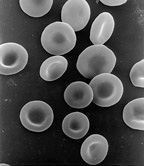
Photo from wikipedia
Iron deficiency and/or iron deficiency anemia (IDA) complicate nearly 50% of pregnancies globally, negatively impacting both maternal and fetal outcomes. Iron deficiency can cause a range of symptoms that range… Click to show full abstract
Iron deficiency and/or iron deficiency anemia (IDA) complicate nearly 50% of pregnancies globally, negatively impacting both maternal and fetal outcomes. Iron deficiency can cause a range of symptoms that range from aggravating to debilitating including fatigue, poor quality of life, pagophagia, and restless leg syndrome. Iron deficiency and IDA are also associated with maternal complications including preterm labor, increased rates of cesarean delivery, postpartum hemorrhage, and maternal death. Fetal complications include increased rates of low birth weight and small for gestational age newborns. Prenatal maternal anemia has also been associated with autism spectrum disorders in the neonate, although causation is not established. Deficiency in the newborn is associated with compromised memory, processing, and bonding, with some of these deficits persisting into adulthood. Despite the prevalence and consequences associated with iron deficiency in pregnancy, data show that it is routinely undertreated. Due to the physiologic changes of pregnancy, all pregnant individuals should receive oral iron supplementation. However, the bioavailability of oral iron is poor and it is often ineffective at preventing and treating iron deficiency. Likewise, it frequently causes gastrointestinal symptoms that can worsen the quality of life in pregnancy. Intravenous iron formulations administered in a single or multiple dose series are now available. There is increasing data suggesting that newer intravenous formulations are safe and effective in the second and third trimesters and should be strongly considered in pregnant individuals without optimal response to oral iron repletion.
Journal Title: European Journal of Haematology
Year Published: 2022
Link to full text (if available)
Share on Social Media: Sign Up to like & get
recommendations!